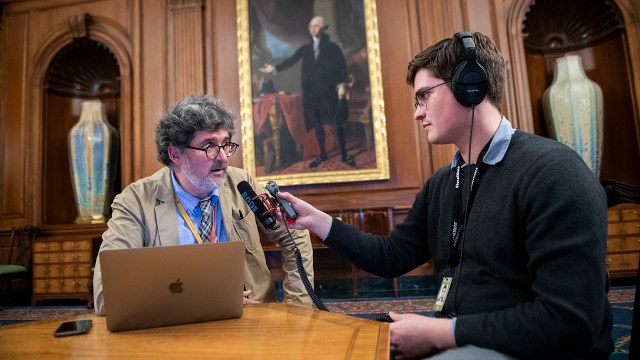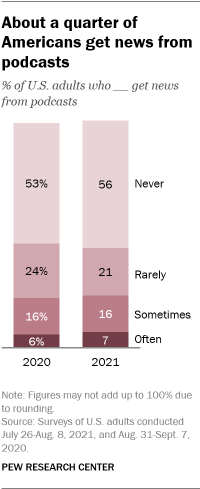
The controversy around Spotify and its podcaster Joe Rogan has drawn new attention to the medium at a time when podcasting has grown to become yet another platform that Americans turn to for news. About a quarter of U.S. adults (23%) say they get news at least sometimes from podcasts, according to a Pew Research Center survey conducted in July 2021.
Podcasts have grown as a content medium. This Pew Research Center analysis assesses how much Americans use them to get their news. To measure this, we surveyed 11,178 U.S. adults from July 26 to Aug. 8, 2021, and 9,220 adults from Aug. 31 to Sept. 7, 2020. Everyone who took part is a member of Pew Research Center’s American Trends Panel (ATP), an online survey panel that is recruited through national, random sampling of residential addresses. This way nearly all U.S. adults have a chance of selection. The survey is weighted to be representative of the U.S. adult population by gender, race, ethnicity, partisan affiliation, education and other categories. Read more about the ATP’s methodology.
Here are the questions used for this analysis, along with responses, and its methodology.
This is the latest report in Pew Research Center’s ongoing investigation of the state of news, information and journalism in the digital age, a research program funded by The Pew Charitable Trusts, with generous support from the John S. and James L. Knight Foundation.
The share of Americans who say they often get news from a podcast is quite small – at just 7% – compared with about twice as many adults (16%) who say they sometimes get news from podcasts. At the same time, more than half of Americans (56%) say they never get news from podcasts, suggesting there is still quite a lot of growth potential for this nascent industry. These numbers are relatively stable compared with those reported in 2020.
Some groups are more likely than others to get news from podcasts. Younger adults, in particular, are more likely than older adults to at least sometimes get news from podcasts. One-in-three adults ages 18 to 29 say they at least sometimes get news from podcasts, compared with 12% of adults 65 and older. About three-in-ten adults ages 30 to 49 (29%) get news from podcasts at least sometimes; nearly one-in-five adults ages 50 to 64 (18%) say they do the same.
Men and women get news from podcasts at similar rates (25% and 21%, respectively).
Those with more formal education and higher incomes are more likely to get news at least sometimes from podcasts. U.S. adults with at least a college degree, for instance, are more likely to get news at least sometimes from podcasts than those with a high school education or less (28% vs. 17%, respectively).
Few differences exist across racial and ethnic groups. That is also true when it comes to political affiliation. Roughly a quarter of both Republicans and independents who lean toward the Republican Party, as well as Democrats and Democratic leaners, get news from podcasts (23% and 24%, respectively).
Note: Here is the topline used for this analysis, along with responses, and its methodology.

